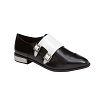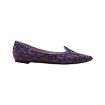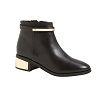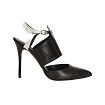Evaluating the relative attractiveness of young women is an activity that occurs so frequently — in casual conversation, in online comments, on television, in football stadiums, on walks down the street, even while receiving awards from the president — that it approaches a national pastime. Etiquette generally requires women to dismiss the attention. Deemed beautiful, a woman may be “flattered” by her positive evaluations, but she must quickly change the subject. (Even beauty pageants pivot away from mere beauty in the final quarter.) Deemed ugly, a woman may critique the system, or retreat to make herself over, or simply disappear. In every case, the object slows the evaluative process by avoiding or redirecting it. To simply stand there, in the harsh light of evaluation, would be insane. You’d have to be some kind of self-abnegating performance artist with nerves of steel — or a teenage girl.
“Am I Pretty or Ugly?” the genre of YouTube video where teens open themselves up for brutal beauty assessments, has been alternately baffling and captivating adults for years — including multiple adult performance artists who have impersonated teens to make videos of their own. British artist Louise Orwin’s performance piece Pretty Ugly is currently showing at a feminist festival at Camden People’s Theatre. “I got torrents of abuse. People were telling me to fuck off and die,” Orwin told Wired UK. “I woke up and read all of this abuse and I really felt it in my stomach. I had to remind myself that it’s not me, it’s the character.”
But what about the tweens who post these videos in earnest? They have browsed “Pretty or Ugly?” and similar material, like Instagram “Beauty Contests”; they know the response is always a deluge of lewd abuse. “Are these little girls so brave?” Orwin wonders on her blog. Other adult theories include “a new form of self-mutilation,” “crowd-sourcing their search for identity,” lack of foresight, and boredom. Some characterize it as a catastrophically externalized version of obsessing in front of a mirror or comparing flaws with friends.
Amid the onslaught of adults worrying about teens and adults impersonating teens, however, a few adults actually asked teens about their “Pretty or Ugly?” videos. Slate’s Katy Waldman interviewed a 14-year-old “Pretty or Ugly?” star who might qualify as “so brave” — or brilliantly primed for reality-TV stardom:
“I give you and Slate magazine permission to talk about my fabulous video and my fabulous self,” she wrote. A little later, on the phone, she gushed that posting her POU video was “one of the best decisions of my life.” “I’m more known at school now,” she added, explaining that her clip had garnered almost 20,000 views.
When I asked her about the mean comments, she brushed them aside. “I know I’m gorgeous,” she said. “Like, so pretty. So what other people think doesn’t matter to me.” […] On the phone, pressed about why she went through the trouble of posing the POU question if the answer didn’t matter, she said she hoped “to see what people would say,” as if the point of the project were judging Internet trolls, rather than being judged. Yet when I asked her whether any of the comments stuck with her, she turned thoughtful. “Someone said I had cute hair but a fat nose. It was really funny. I know I have a fat nose. I’m going to get plastic surgery when I’m older because I’ll be rich and successful.”
Her words suggest an unexpected explanation for the adolescent logic behind “Pretty or Ugly” videos. Setting aside theories like boredom or self-mutilation, what if teens are actually making these clips as a way to try on the trappings of celebrity? In a sense, the girls making “Pretty or Ugly?” videos are “playing house” with fame — by opening themselves up to critique, they’re simulating a miniature version of stardom. All prominent people have haters, after all. They discuss them in interviews; they lament them on Twitter; they sing about them in songs. Whereas a younger girl might pretend to do chores when imagining what it’s like to be an adult, “Pretty or Ugly?” participants go through the motions of opening themselves up to critique, then vanquishing haters while enjoying the spoils of being “more known at school” or online. Having haters becomes a status symbol — albeit one that comes with potentially insidious emotional baggage.
Dismissing haters is thus one part survival tactic, one part cultural ritual. As more people find themselves battling hater-bullies from their personal lives — and hater-strangers accrued in public online fora — dismissing haters has become a pastime of its own, a skill worth cultivating. “Hater quotes” are an inspirational genre, complete with artfully designed iterations on Pinterest. Hater survival guides are hot commodities. (I recommend Ann Friedman’s Hierarchy of Haters.) “Haters gonna hate” is a lyric, GIF,T-shirt, bumper sticker, Christmas stocking, and dog sweater. (And academic inquiry.) “Pretty or Ugly?” videos may function as early skirmishes in a lifelong battle against haters, or a self-imposed rite, like hazing. Practitioners prove they can handle the slings and arrows of online adolescence by throwing themselves into a treacherous part of it.
This doesn’t negate other theories; it’s possible that the self-imposed tortures are masochism, status symbol, and rite of passage all at once. It’s also possible that “Am I Ugly or Pretty?” isn’t about validation as much as it is about attention — and it just so happens opening yourself up to physical scrutiny is a disproportionately effective attention-seeking method for teen girls. “Models look like teenage girls; women want to look like teenage girls; men want to fuck teenage girls,” Orwin noted in an interview with Buzzfeed. And everyone likes to worry about teen girls. Sophie Roessler, the twentysomething artist whose “Am I Pretty or Ugly?” performance piece wound up in Jezebel and Good Morning America discussions last year, has since appended her video (shown above) with a message for teen girls who come across it in earnest:
Part of the reason I made this video is because I understand where these girls are coming from on a personal level. I’m sure many commenters on other videos, as they have with my video, say that beauty comes from within. I completely agree with this, but you hear it a lot and it can lose its meaning. What I want to say is this: no one in middle school thinks they are pretty. Even the girls that you think are perfect are also insecure. Love yourself for who you are, or a lot of time will be wasted standing in front of a mirror nit picking about something other people don’t even notice.
Roessler is something of a test case for growing up online; her website points readers to a blog she has maintained since the age of 14. Noting that “life gets easier” after middle school, Roessler concludes, “Now get off the Internet and go eat ice cream!!!”








